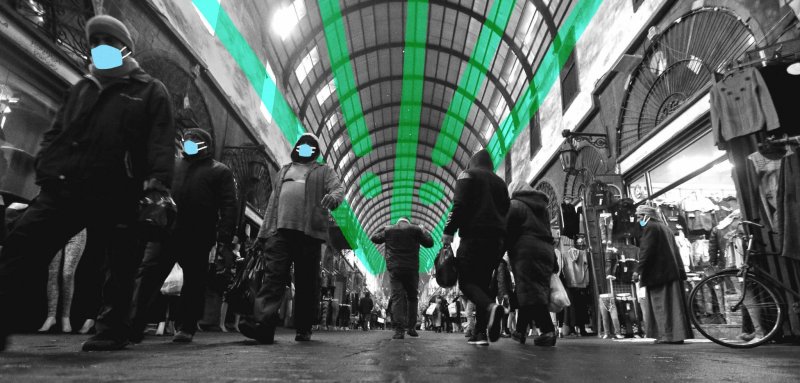This is a new kind of fear; it is different from the one to which we are accustomed. It is unfamiliar, even to us, who have experienced all sorts of catastrophes. Even the darkest hallways of our imagination did not produce such a fear that has succeeded in exposing the fakeness of our courage. Before this predicament, the claims that we disregard crises because we have lived through so many dark days, diminished. The daily prayers for a meteor to come and salvage us at last, have become no more than meaningless drivel before the survival instinct that endures all things, even in the cruelest and most dreadful circumstances.
I think of words suitable for all this madness; surely they are not “I love Damascus, my most delicate love”, the words of Lebanese poet Saïd Akl. I only love the Damascus that lives in my memory now. If Nizar Qabbani were alive, would he still say “I am the Damascene, if you dissect my body, [grape] clusters and apples would pour therefrom”? Would Mahmoud Darwish have been inspired to write: “In Damascus: the stranger sleeps on his shadow standing like a minaret in eternity's bed”.
Perhaps, the most appropriate words to describe Damascus today: It tries to preserve whatever is left of its pride as the late poet Adam Hatem wrote: “I stand on the summits of loss and pray that God would crown me a prince of ruin”.
What if this isolation goes on for months? How would this new life look like? Damascus has always suffered from traffic, but it is the kind of traffic that comes with the vacuum; for dense population does not necessarily mean life.
We do not have songs that glorify the losses of Damascus like “Oran, you are gone, what a loss” or “go with peace, Oran”. I feel that I have lost Oran even though I never set foot in it, because of the warm and cosy raï songs, which are brought closer to our aching hearts and the sorrows of loss, loneliness, and alienation from our homes.
Comparisons, which near hallucinations, continue. All the scenarios of horror come back to the mind that tries to rate it by the level of fright its memory induces. The forgotten feelings we experienced when we ran in order to escape, after shells started to fall one after the other on every area that I leave, or the shower of celebratory gunfire which accompanied me until I reached the entrance of my building, or the trembling heartbeats every time I had to pass through an area where an explosion had taken place days before. Or searching for that spot exactly in the middle of the house, in order to shield ourselves from that midnight rocket, and following repetitive Facebook posts that never cease to be startled by the volume of blasts, as if it was the first time, but it somehow reminds us that we are still alive, and that this night is going to pass, much as the nights that went before, and the sun of a new day will rise, while feelings that this epidemic today remain mysterious and are yet to be discovered.
Perhaps, the most appropriate words to describe Damascus today: It tries to preserve whatever is left of its pride as the late poet Adam Hatem wrote: “I stand on the summits of loss and pray that God would crown me a prince of ruin”.
What if this isolation goes on for months? How would this new life look like? The city has always suffered from traffic, but it is the kind of traffic that comes with the vacuum; for dense population does not necessarily mean life. I spent my childhood and half of my teenage years in al-Mazraa neighbourhood of Damascus. Even though people usually get attached to the place that witnesses the beginnings of their memories formation, I never loved it. I felt the coldness of its streets, the froideur of its residents, its closed windows, and its balconies which are dedicated to piles of mess. It did not have those corners where young men hung out, and you rarely heard the laughter of young women. Not a day brought the raucous sounds that indicate life, as if its street had retired long ago.
That feeling accompanies today. The freezing cold that wraps every neighbourhood, the cold that runs in our limbs in spite of all the warm layers of clothing. As if every street has become al-Mazraa… what is the lost feeling in this city? There are no souls here but walking bodies out of Zombie TV series, without us knowing which season are we living through. Maybe the series will be canceled because the excessive repetition of miseries will render them boring and uninteresting. With time, we lose our ability to be empathetic; we grow unable to sympathise even with the closest of people.
I have always loved to escape from reality to become the protagonist of one of my favourite novels. But I certainly never wished to become a character from Blindness by José Saramago, or The Plague by Albert Camus. I never desired to live through the same conditions that befell the people of Oran: “they drifted through life rather than lived, the prey of aimless days and sterile memories, like wandering shadows that could have acquired substance only by consenting to root themselves in the solid earth of their distress.”
Maybe living with the protagonists of Márquez’s Love in the Time of Cholera would have been more charming. Love, there, is capable of defeating helplessness, aging, time, and even the the cruelest of epidemics. Love, in the novel, and in reality, remains the motivation to go forward and continue living, for “all roads lead to a love that intensifies when it approaches death”.



